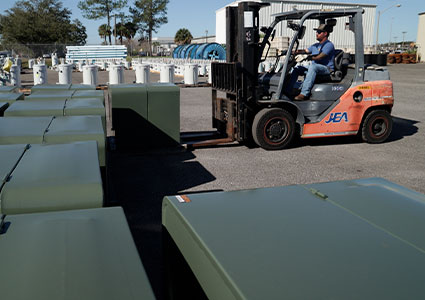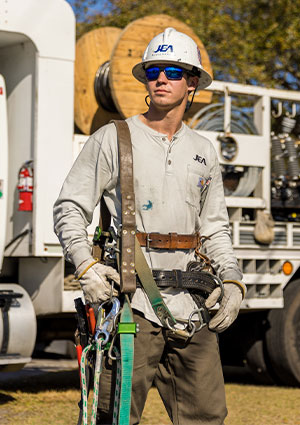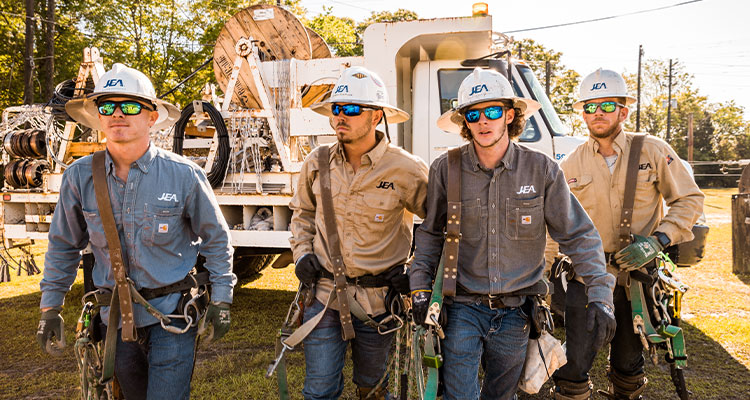As Florida’s largest municipal utility company, JEA provides reliable supply while innovating for tomorrow
Based in Jacksonville, Florida, JEA is the largest municipally owned electric, water, and sewer utility company in the state, and the eighth largest in the US. Serving more than one million residents across Northeast Florida, JEA is dedicated to improving lives and building community.
As part of its electricity operation, JEA owns and operates an electric system with four generating plants and transmission and distribution facilities, including 744 circuit miles of transmission lines and more than 7000 miles of distribution lines. With emerging demand for sustainable energy, the business also sources electricity from eight solar photovoltaic sites and is constantly finding opportunities to expand and strengthen its renewables portfolio. 
JEA’s water system, on the other hand, comprises 39 water treatment plants and 139 artesian wells that tap into the Floridan aquifer. The sewer system consists of over 1500 pump stations, 4000 miles of collection lines, and 11 wastewater treatment facilities. As part of JEA’s mission to improve the water quality of the St. Johns River, the company uses a reclaimed water system to supply treated water for irrigation use. This reduces the amount of nitrogen released to the river, but also reduces demand on the potable water supply taken from the Floridan aquifer.
Having spoken with Jenny McCollum, Chief Procurement Officer, around one year ago, we’re keen to catch up with her to hear about JEA’s latest developments. We’re also joined by Rodney Lovgren, Senior Manager of Procurement Support, and Lisa Pleasants, Senior Sourcing Manager to gain further insight into the company’s supply chain.
“JEA has made significant strides in several areas over the last year or so,” Jenny begins. “We’ve launched innovative infrastructure projects to enhance our utility services, introduced new sustainability initiatives, and received a top ranking from JD Powers for business satisfaction among mid-size utility companies in 2023.
“We serve over one million residents in Northeast Florida, providing a comprehensive suite of utility services including electricity, water, and wastewater management. Our offering also includes various environmental services, all of which are aimed at promoting sustainability and conservation within the community.
“We’ve also expanded our renewable energy portfolio and we’re executing our integrated resource plan with goals to achieve 35 percent clean energy by 2030,” she explains. “We currently source clean energy from Plant Vogtle, a nuclear power plant that is the largest source of carbon-free electricity in the US, but we plan to expand our portfolio with additional solar and natural gas generation.”
A pillar of the community
With community spirit at its core, JEA prides itself on local support and employee development. “We offer a robust training and development program, as well as a competitive benefits package and an inclusive working culture,” Jenny details. “We also recently received recognition for our good neighbor community service activities from the American Public Power Association. This is a remarkable achievement that reflects the hard work of our employees who collectively volunteered more than 4300 hours across the community.”
To strengthen employee opportunities, JEA has partnered with a professor of supply chain management at Florida State University (FSU). “Collaborating with FSU has enabled comprehensive training for our team, encompassing both fundamental concepts like sourcing and negotiation, as well as advanced topics like category management and risk mitigation strategies,” Lisa explains.
“The effectiveness of the program is evident in the growing number of staff members who are Certified Professional in Supply Management (CPSM). Specifically, 15 out of 18 of our senior level staff within procurement have either received CPSM status or are working towards the certification. Recognized internationally, CPSM is the pinnacle of supply chain management, signifying mastery of core concepts essential for success. 
“However, our commitment to attracting, developing, and retaining talent extends beyond this partnership,” Lisa adds. “We actively engage with various institutions through job fairs and internships. Additionally, we’re committed to education. To promote clean energy learning, for instance, we’ve partnered with UNF to establish the JEA Sustainable Solutions Lab.”
Constant evolution
Turning to the materials management in supply chain specifically, Rodney says: “As part of our strategy to ensure material availability and adequate supply to support existing customers and growth, the supply chain materials management has implemented more robust materials management processes. We aim to maintain safety and storm stock to respond to restoration needs, as well as increasing our overall supply base by qualifying and negotiating contracts with new suppliers. By implementing more robust supplier service and testing requirements, we ensure the quality and supply availability of potential new suppliers.”
Jenny adds: “We’re evolving our procurement organization from a category manager led structure to one led by portfolio managers with assistance from category management specialists. With synergies across the group, this shift will bring several benefits such as more strategic resource allocation and innovative sourcing strategies that optimize costs.
“Overall, this structure enables our team to make data-driven recommendations more efficiently. This ability to make quick, yet effective decisions empowers us to react to market changes and emerging opportunities. This ultimately strengthens our competitive edge, fostering a more strategic approach to procurement and driving cost savings.
“Here at JEA, we are committed to serving customers’ daily utility needs while also investing in ageing infrastructure to comply with federal and state legislation,” Jenny proposes as our conversation draws to a close. “We have been transparent with our customers about increasing our base rate, which is necessary to accommodate regional growth and modernize our infrastructure. Despite these incremental increases, JEA continues to operate the lowest residential utility bills compared to other major metro areas in Florida.
“We are projected to invest nearly $9 billion in our operations, maintenance, and capital projects over the next nine years to meet growth demand, regulatory requirements, and clean energy goals,” she concludes. “We’re currently building a water purification center, for instance, which is due to be completed in 2025. This will ensure long-term water supply, resiliency, and sustainability while protecting the Floridan aquifer for future generations.”
